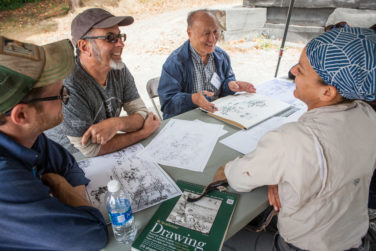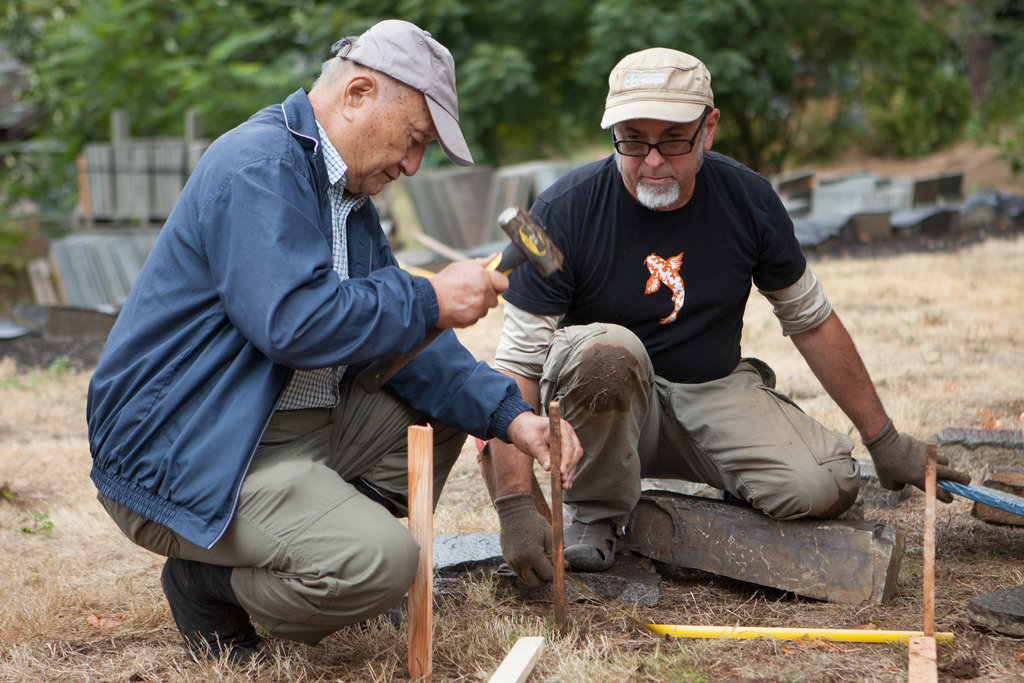 When Tim Gruner joined Portland Japanese Garden’s Waza to Kokoro: Hands and Heart professional training seminar at its launch in 2016, he did so as a gardener with 30 years of hands-on experience. As part of the staff at Anderson Japanese Gardens in Rockford, Ill., he worked under the direction of Hoichi Kurisu, himself an early director of Portland Japanese Garden.
When Tim Gruner joined Portland Japanese Garden’s Waza to Kokoro: Hands and Heart professional training seminar at its launch in 2016, he did so as a gardener with 30 years of hands-on experience. As part of the staff at Anderson Japanese Gardens in Rockford, Ill., he worked under the direction of Hoichi Kurisu, himself an early director of Portland Japanese Garden.
“I witnessed projects from the conceptual stage all the way through construction and what has turned into relatively long term fostering of the garden,” said Gruner, now Anderson Japanese Gardens’ curator and head of horticulture. “I have been lucky to be in an environment where garden design and fostering were infused with the art, culture, and spirit of the Way of Tea.”
But at the seminar — where Gruner took part with ten other experienced garden practitioners in hands-on and theoretical instruction in Japanese garden arts by Garden staff and visiting Japanese instructors — he found himself as open and eager to learn as 30 years ago.
No matter how experienced a gardener is, there is always more to learn, especially if one adopts what Zen Buddhism calls shoshin – beginner’s mind. That is, an attitude of openness, enthusiasm, and lack of preconceptions in study — regardless of advanced knowledge.
“Mitsuhashi sensei told me that you can never build a garden better that you are, and to study the Way of Tea and ikebana,” said Gruner, referring to visiting instructor Kazuo Mitsuhashi of the Garden Society of Japan. “His words run parallel with my feeling of being a perpetual student. In effect, the Waza to Kokoro workshop offered a compressed version of my 30-year experience at Anderson Gardens. Waza to Kokoro connects participants with senior gardeners, and with the Portland Japanese Garden, itself the work of past and present masters.”
Gruner described his learning takeaway as not only technical skills, but about cultivating his eyes and learning a new way to see the garden. “I came away with a deeper understanding of how the tea garden uses space and material to create an environment that is calming and sensitive,” he described.
Because the seminar weaves together different learning activities and topics combining into a holistic idea, “I gained a better understanding of the spirit, heart and principles of tea, and how this affects the gardener, the garden, and the guest. It was an amazing experience to feel the beauty of a tea ceremony in the morning, and then go out into the stoneyard and create the key components of a tea garden!”
Continually elevating understanding of the heart of the garden, said Gruner, is essential to be able to do justice to his garden because “I navigate the responsibility of caring for a living work of art that connects so many people with the timeless beauty of ever-changing nature in an increasingly disconnected world.”
In the spirit of having a beginner’s mind, he continually reminds himself of ideas shared by instructors at the seminar, including visiting instructor and eighth-generation gardener Tomoki Kato: “No matter how hard we try, we cannot achieve nature’s beauty. But if we understand the depth of nature, we can weave in a human essence — and create a beautiful garden.”
Application for the beginner-level Waza to Kokoro seminar, which takes place June 3-9, is open until Feb. 15. Application is open to landscape professionals of all sectors, and scholarships and early bird discounts are available. To apply, go to japanesegarden.org/thecenter
The seminar is presented by the International Japanese Garden Training Center, which is funded by the Japan Foundation Center for Global Partnership. In 2018, the Center was the recipient of the American Public Gardens Association award for program excellence.
